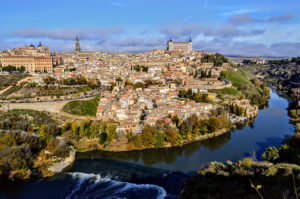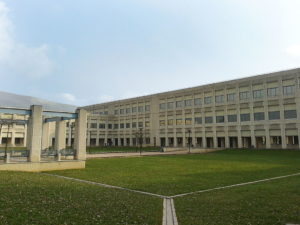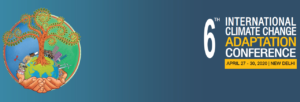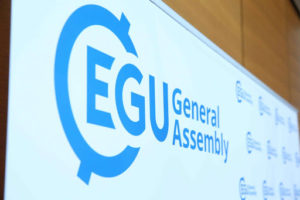Events
Upcoming Events
Month view
Agenda view
Event history

The University of Valladolid is member of the Spanish Association of Energy Economics / Asociación Española para la Economía Energética (AEEE), a new Spain-wide network of energy modellers and Spanish branch of the International Association for Energy Economics (IAEE). The Network organises a first conference under the motto “Decarbonising our energy supply: Moving from words to deeds / La descarbonización energética: de las palabras a los hechos“.
The conference will take place on 29, 30 and 31 January 2020 in the University of Castile-La Mancha, Faculty of Law and Social Sciences in Toledo/Spain, and is open to the participation of national and international scientists as well as public and private sector representatives.
The University of Valladolid will present the MEDEAS II models as part of the conference.
More information can be found at: http://www.aeee.es/xv_congreso_aeee/

Forests cover approximately 30% of the Earth’s land area, host 80% of its biodiversity; support the livelihoods of around a quarter of the world’s population.
At the EU level, forests cover approximately 42% of the land area. In addition to providing economic and job opportunities to local communities, forests are an irreplaceable biodiversity reservoirs and carbon sinks; they prevent soil erosion; they provide clean water through filtration; they clean the air; they play a central role in risk reduction measures vis-à-vis natural disasters, such as floods, droughts, heatwaves, erosion or landslides; and they support leisure and recreation, essential for human health.
The world’s forests are in serious danger from deforestation and forest degradation, with a forest area of 1.3 million square kilometres lost between 1990 and 2016. Pressures on EU forest ecosystems due to climate change and unsustainable forest management are a reason for concern and are expected to increase in the future, due to increasing demand of timber coming from the bioenergy the bioeconomy sectors, in a context where illegal logging continues to be recorded in a number of Countries. Overall, protecting forests means protecting biodiversity and working for a climate neutral and climate resilient land.
In this context, DG Environment organises an international Conference on Forest for Biodiversity and Climate Change on 4th and 5th February 2020 in Brussels (Charlemagne building, European Commission).

The incoming European Commission’s policy agenda is arguably its most ambitious to date. During its five year term, the Commission will seek legally binding commitments to make Europe the first climate-neutral continent by 2050, unlock €1 trillion in green transition financing by 2030, and take a global leadership role in the governance of artificial intelligence, among other headline goals. It will also launch Horizon Europe, its largest ever research and innovation programme, with a clearly defined range of impact targets.
In February, the Science|Business Annual Network Conference will bring together over 300 stakeholders for two main purposes: first, to take stock of latest developments around the key pillars of the new agenda; and second, to explore their implications for the science, technology and innovation communities that will have a critical role to play in driving progress. By extension, it will address the challenge of developing the next generation(s) of researchers, innovators and entrepreneurs who will have a leading role to play in delivering a climate-neutral, sustainable Europe by 2050.

IAERE is glad to announce its Eighth Annual Conference, to be held at the University of Brescia on February 6th-7th, 2020.
Important dates:
30 November 2019: deadline for paper/long abstract submission
7 January 2020: notifications of paper/long abstract acceptance
20 January 2020: deadline for registration for inclusion in the Programme
6-7 February 2020: Conference

Adaptation Futures 2020 in India.
The Energy and Resources Institute will co-host the Adaptation Futures 2020 with the World Adaptation Science Programme (WASP) in Delhi from April 27-30, 2020. It is the sixth in the Adaptation Futures international conference series on global adaptation and the first to be held in Asia. Adaptation Futures is the flagship event of the World Adaptation Science Program, which is one of the four components of World Climate Programme (WCP) based on the World Meteorological Organisation Congress XVI Resolution 18. As a premier event in the global adaptation spectrum, Adaptation Futures is a unique platform to facilitate dialogues towards action oriented solutions from a diverse range of stakeholders that includes academia, practitioners, scientists and policy makers from across the world.
India due to its high reliance on climate sensitive sectors such as agriculture, water, and forestry for resources and livelihoods faces an urgent need for adapting to the risks posed by climate change. The country has been making significant efforts over the years to bring adaptation issues to the forefront in the evolving global climate regime. The Government of India has also formulated mechanisms to integrate adaptation action as part of the developmental process under the National and State Action Plans on Climate Change. India along with other developing nations, has been instrumental in putting forth a global goal of adaptation with an aim of enhancing adaptive capacity, strengthening resilience and reducing vulnerability under the Paris Climate Agreement. While adaptation requires local and national set of actions, there is a need for significant global cooperation in meeting the resource requirements of developing countries. In this context, Adaptation Futures 2020 will be an ideal opportunity to give visibility to the adaptation requirements of developing and generate significant dialogues around actionable solutions.

The EGU General Assembly 2020 will bring together geoscientists from all over the world to one meeting covering all disciplines of the Earth, planetary and space sciences. The EGU aims to provide a forum where scientists, especially early career researchers, can present their work and discuss their ideas with experts in all fields of geoscience. The EGU is looking forward to cordially welcoming you in Vienna.

From May 29th – June 1st 2020, Vienna will host a thematic degrowth conference, focusing on Strategies for Social-Ecological Transformation. The Vienna conference will explicitly focus on exploring strategies for a degrowth transformation, complementing the 2020 international degrowth conference in Manchester. The conference is hosted by the association Degrowth Vienna as well as several university institutes from Vienna. It will take place at the University of Vienna and Semper Depot.
The conference will have a participatory design, including a thorough documentation process to generate tangible outcomes for the degrowth movement and research community. The conference consists of two main parts, firstly understanding past and future transformations and the role of strategies and secondly, strategies in practice.
Scholars, practitioners, activists and artists are warmly invited to send proposals before December 31th, 2019 for one or more of the three different forms of contributions: 1) Submitting to a Standard Session, 2) Faciliating a Workshop Session or 3) Hosting Consecutive Session. Within these forms, different formats are welcome, and participants are encouraged you to develop the format which fits your purpose best. Each session lasts 90 minutes. Keep in mind, this conference has a thematic focus on strategies for degrowth, which requires that only submissions closely related to this theme can be accepted.

AERE’s signature Summer Conference gathers the world’s leading environmental and natural resource economists for two days of outstanding academic programming in a collegial atmosphere. The 2020 AERE Summer Conference and Pre-Conference Workshop will be held at the Hyatt Regency Miami on June 3-5, 2020.
2020 Summer Conference Organizing Committee
David Kelly, University of Miami
Christopher Parmeter, University of Miami

The Dresden Nexus Conference (DNC) is an international conference series dedicated to advancing research and the implementation of a Nexus Approach to resource management. By bringing together actors from a diverse range of disciplines and sectors, DNC fosters dialogue on how nexus thinking contributes to achieving the United Nations Sustainable Development Goals (SDGs).




